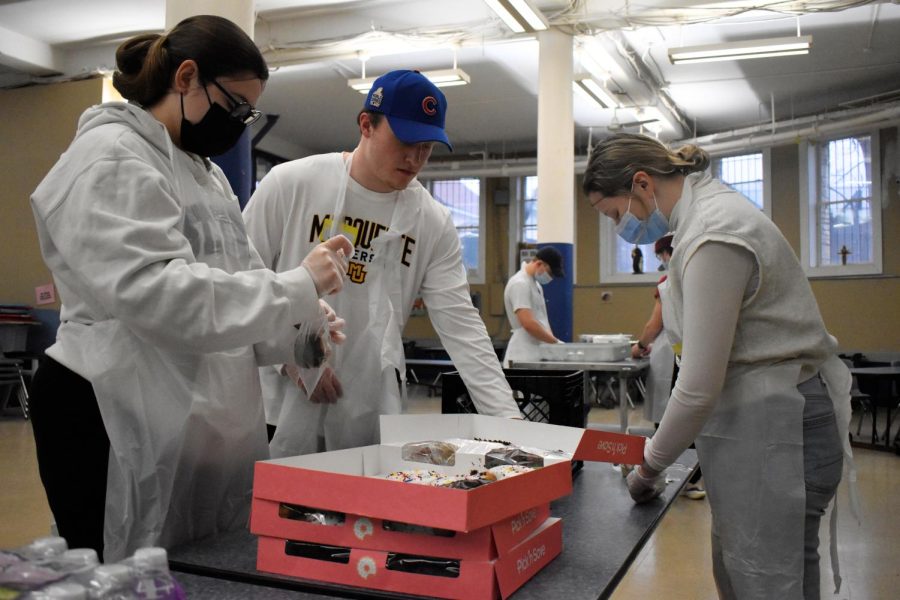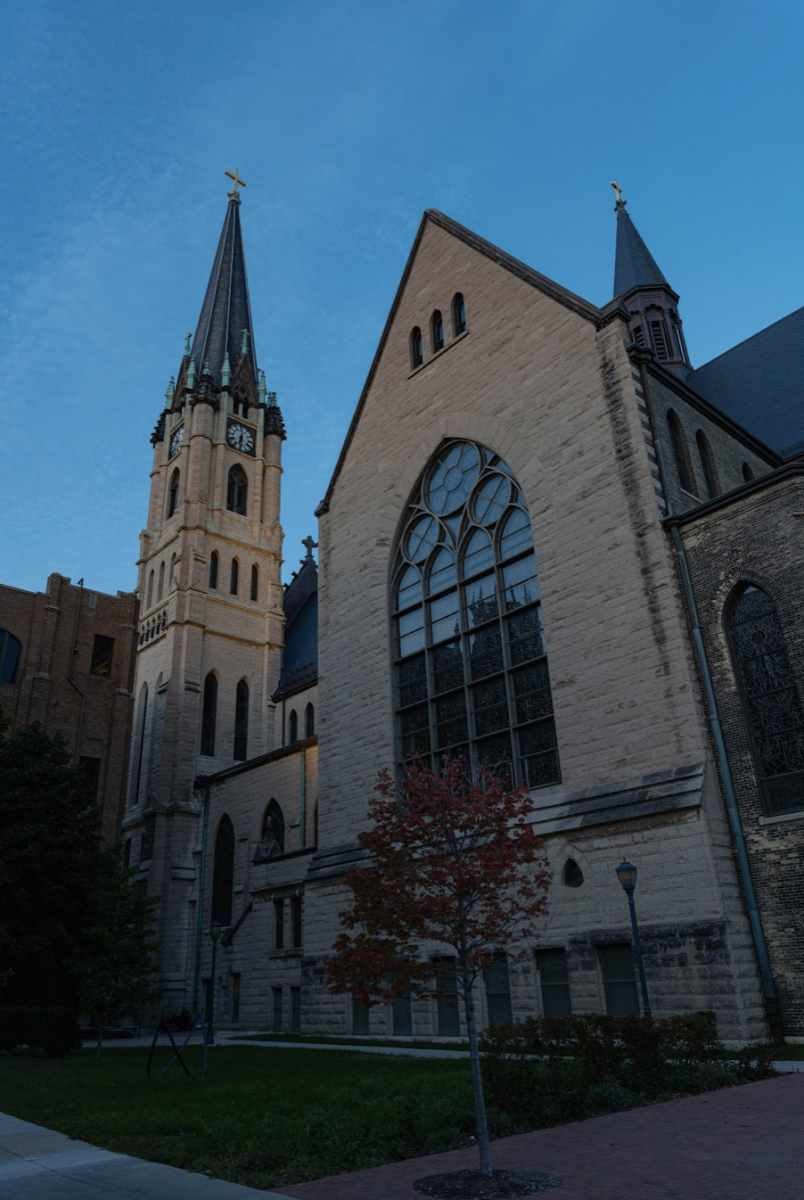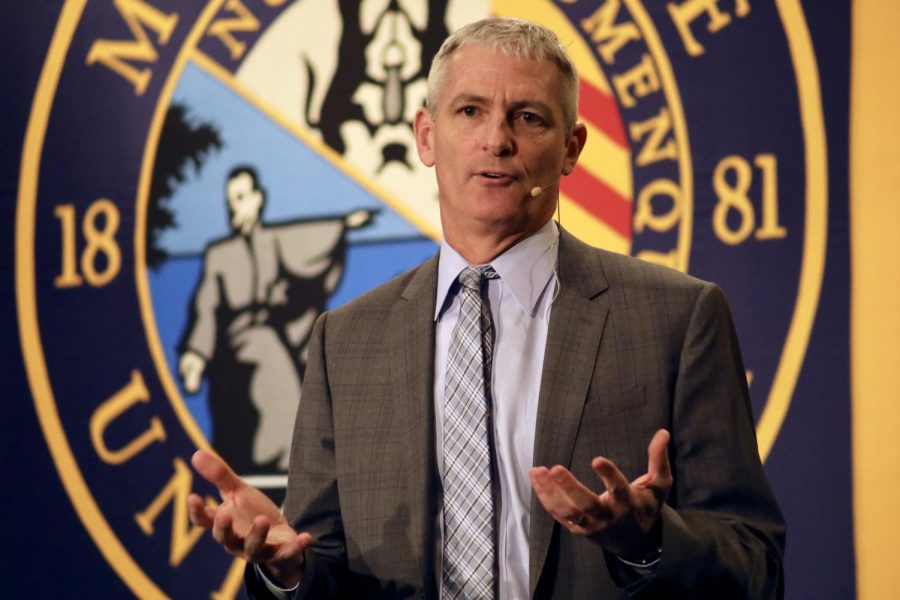 When Steve Blaha came to Marquette three years ago to start a program for initiating students into the Catholic Church, the intent wasn’t about converting as many non-Catholics as possible.
When Steve Blaha came to Marquette three years ago to start a program for initiating students into the Catholic Church, the intent wasn’t about converting as many non-Catholics as possible.
“We’re not in the numbers business,” Blaha said. “Our goal is to shape our program around a student’s life while making sure that the Catholic Church is right for them.”
The Rite of Christian Initiation of Adults, is how three students who are not Catholic will become fully initiated into the church this Sunday at 4 p.m. at Gesu Parish. They will be baptized, receive their First Communion and be confirmed.
In addition, four students will be baptized and 10 students will be confirmed on Sunday. Each of these students has undergone a journey in the faith, Blaha said, though those being fully initiated had it the toughest.
Bethany Snyder, a senior in the College of Arts & Sciences, is one of those students.
“Throughout the process, I learned how important my faith life is to me. It has been wonderful to grow closer to God in prayer and service,” Snyder said.
Snyder said that she had been thinking about joining the Catholic Church for awhile, but that taking Susan Mountin’s Christian Discipleship of Dorothy Day class last spring actually inspired her to seek out the RCIA.
“(It) really helped solidify the decision for me,” Synder said. “Before that I was interested but I didn’t fully agree with everything like I thought I should. Dr. Mountin taught us that it is important for us, as the Church, to help challenge and move the Church forward in social justice issues.”
Snyder went to Campus Ministry at the beginning of the year to start her RCIA process.
“We let them know that they are in for a powerful experience and a major commitment,” Blaha said. “It is not right for everyone.”
Those preparing for the sacraments attend Mass each Sunday and take part in group prayer and reflection. They go on retreat, do service work with the poor and keep a journal about the initiation process.
Blaha said RCIA at Marquette is designed specifically for students’ busy schedules. In the past, some students have dropped out because they were unsure if they were being called. Blaha said always respects students’ choices as “good discernment.”
Christina Schreiber, a senior in the College of Health Sciences, is also receiving full initiation into the church.
She said that even with her hectic schedule this year, she has always been able to find time for her RCIA events.
Blaha said it is an enriching experience to work with the initiates.
“We get such phenomenal students each year,” he said. “For these students, their faith lives are vibrant and authentic. They each truly have the mark of a healthy spiritual life and strong faith.”
Synder said the Catholic Church “gives me life,” and that going to Mass and being part of the congregation is how she learned to express her faith in God.
“The process has been wonderful. Steve Blaha, the team and my peers in the program are all wonderful and it has been great to learn from and with them,” she said.









MU_Theology_Alum • Apr 21, 2010 at 9:36 pm
I’ll keep this brief.
Thank you amandamarie for your thoughtful commentary. It’s clear that you not only care a great deal but you put a tremendous amount of time and effort into your post (that is something that is not always present within the medium of internet discussion).
However.
I believe when you relegated the Nicene Creed to the status of a mere “helpful tool” before going on to align yourself with Gustavo Gutierrez and Juan Segundo et al over and against the Church Doctors, things got a bit off track.
No one is trying to take away the transformative power of works, service, actions, etc. But these things must be properly balanced and contextualized within the Christian message. We must keep the proper perspective on works: they help to complete our faith, to live our faith, but they ought not supplant our faith.
If works become our faith, that’s when we erode to merely an organ for charity rather than a soteriological vessel for God. This Catholic message, Christ’s message, was first to have faith in God and then the rest: not the reverse.
amandamarie • Apr 15, 2010 at 4:36 pm
Friends,
I was disturbed by this comment from MU_Theology_Alum: “Is the kind of change envisioned by Snyder and Mountin to turn the Church into a purely social service organization? Service to others is an eminently worthy component of Church function, and well within its ambit, but it is not central mission installed in the founding charter (see: Nicene Creed).”
Aside from the fact that this first question is a gross over-simplification of two individuals’ views (I happen to know both Dr. Mountin and Bethany Snyder and can say that neither of them understands the Church as “a purely social service organization”), I am also disappointed by the fundamental misunderstanding of our Gospel call that motivates the second half of this comment. “Service to others” is more than an “eminently worthy component of the Church function;” in fact, the pursuit of justice and the participation in the transformation of our unjust world is a “constituitive” dimension of the preaching of the Gospel (1971 Synod of Bishops). In other words, the Jesuit ideal of forming “men and women for others” ought to be interpreted as something that is ESSENTIAL to our Catholic identity rather than something extracurricular. But that makes a lot of Catholics squirm.
The argument that service to and solidarity with others is something that is “well within” the “ambit” of our Church function and yet not part of the “central mission installed in the founding charter” is probably the reason we don’t hear many priests speaking from the pulpit about social justice or compassion for the oppressed or transformation of marginalizing systems. But in this age of hierarchies and bureaucracies (and we would certainly be blind to claim that the Church is at all exempt from this messiness), we need to hold fast to our center more than ever. While the Nicene Creed has been a helpful tool for us in that it articulates our beliefs, there is no clearer example, no text or interpretation or doctrine that is more foundational to our faith than the life, death, and resurrection of Christ. If anything is our “founding charter,” it must be the example of Christ. It is when we forget that CHRIST is at the heart of things that we find ourselves caught up in a complicated and often unreasonable web of rationalizations that values law and the status quo more than love and the example of love that Jesus provided for us.
The God of the Old Testament is a God of justice who is constantly aligned with the underdog and responds often to the cry of the oppressed (e.g., the Manna in the desert, saving the Israelites, etc.). We read in the Hebrew Scriptures about revolutionary practices like the Jubilee Year when, once every generation, the land reverted back to the original owners and all debt slaves were emancipated so that no one was trapped in perpetual servitude, no one forgot that s/he was a steward and not the permanent owner of his/her possessions, and everyone remembered that a system of exploitation has no place in a society that is trying to bring about the Kingdom of God.
Jesus continued this concern for the oppressed during his life, and we need to look no further than the company he kept at dinner. Sinners, prostitutes, tax collectors, and the like were all invited to the table– a reminder to us that, as men and women created in the image and likeness of God, we are called to that same love without limits or judgment. Specifically, we are called to reach out to the poor in service and companionship. Jesus could have done any number of things on the eve of his death, but he chose to humble himself and wash the feet of his apostles. And yet we overlook the essential role that service to and love of neighbor plays in our faith?
We are told that doing so has dire consequences, and perhaps this is something that Ms. Snyder and Dr. Mountin understand better than the majority of Catholics in the pew: whatever we do for the “least” among us– the sick, the imprisoned, the hungry, the naked, the alien, the oppressed– we do for Jesus himself (Mt. 25). And depending on our response to the injustices in our world and our attempts to live out our Gospel mission to be people for others, we will be invited to the banquet table– or not. There’s no mistaking this commandment to love one another, and while our faith also calls us to individual reflection and a personal relationship with God, I believe that Jesus suggests to us through his life and his emptying on the cross that the only way to a relationship with God is in fact through service to God’s children. That seems like it ought to be our “charter.”
We don’t hear about this because this is scary. But no one– Jesus included– ever suggested that taking up our cross and following Christ would be easy. It is easy to say that service is an extra, recommended part of the living-out of our faith. It is easy to overlook the members of our One Body who are alienated, neglected, and exploited. It is easy, Jesus says, to love our friends. I understand why Mr. Blaha does not proselytize to potential Catholics or urge them, against their discernment, toward Baptism into the faith: what they’re signing up for, so to speak, is not to be taken lightly. I think that Ms. Snyder understands this, and that is all the more reason to draw inspiration and hope from her adult choice to try to live a Christ-centered life. If our faith is truly a Christ-centered faith, we’ve got our work cut out for us. It’s time to take off our blinders and recommit to our own Baptismal promise.
“Do you love me?” Jesus asked Simon Peter in Jn21 (listen for it this Sunday!) Simon Peter, who has just messed up BIG TIME, answers yes. And Jesus welcomes him back and commissions him firmly.
If we say yes, Jesus tells us our mission too:
“Feed my lambs.”
“Tend my sheep.”
“Feed my sheep.”
MU_Theology_Alum • Apr 9, 2010 at 7:50 pm
I understand striking that right balance with language, but it commutes a lukewarm tone.
Remington Tonar • Apr 8, 2010 at 7:22 pm
I think we need to be careful in judging people’s intentions based on their words as quoted in newspaper articles (I could insert a jab at the Tribune here in good fun, but I will refrain). As the seminal 20th c. theologian Bernard Lonergan notes, we cannot judge our experiences until we’ve first understood them.Thus, the task should be to understand Steve’s comments in the context of his character, style, and mission. With this in mind, and as someone who knows The Blaha, I can say with resolute certainty that Steve is indeed “on fire with the truth,” and that he has a deep concern for the well being and advancement of the Catholic Faith. As someone in a pastoral position, Steve’s language must maintain a balanced dialectic between espousing the truth and conveying an open and welcoming demeanor, an attitude that respects the monumental decision of religious conversion. A violation of this delicate dialectic would hinder Steve from being able to fulfill his vocation of being a resource for students and an instrument of the Church. Thus, in his role, the language Steve employs must be pastoral in nature and tone, or else it would not be effective in giving itself to prospective converts (I use “giving” here in a phenomenological sense, since language is powerful and often “gives” its own meaning).
Now, in some circles, the fact that I have given Steve my stamp of approval is in itself convincing (I say this in jest). However, if appealing to my own authority is not persuasive, I would encourage a visit to Steve’s office, after which I am sure you would come to understand him as someone who is deeply in love with Christ and the Church, as well as someone who is open to dialogue and constructive criticism.
For the purpose of full disclosure, I am a Marquette alumnus, a graduate student in theology, as orthodox as they come (I’m an Ultramontanist), a convert to Catholicism myself, and a former employee of MU Campus Ministry.
MU_Theology_Alum • Apr 8, 2010 at 6:09 pm
I completely agree with MUFan.
There are a lot of troubling aspects touched on and glossed over in this article. Since when was the Truth not for everyone?
Is the kind of change envisioned by Snyder and Mountin to turn the Church into a purely social service organization? Service to others is a eminently worthy component of Church function, and well within its ambit, but it is not central mission installed in the founding charter (see: Nicene Creed).
It concerns me that the tone is the same recognized in salesmen pitching a product and the features it offers for the user, rather than someone on fire with the Truth. I pray that I am wrong.
MUFan • Apr 8, 2010 at 5:52 pm
How wonderful! I am very glad for those three students.
Something in this article is very troubling though.
Steve Blaha’s quotes show a lack of formation in the Catholic faith that would probably impair his abillity to teach it to others.
“We’re not in the numbers business,”
-Well that it is all well and good, one would wonder if any of the Catholic campus ministries operating near state schools like Madison and UWM were able to gain more than three converts, and they would be doing so swimming against the current of a secular school, you’d think a Jesuit school like MU would be fertile ground for students learning about the Catholic faith and some deciding to join it.
“Our goal is to shape our program around a student’s life…”
-While every conversion is unique and individual and so some degree of ‘shaping’ the program is commendable, on a certain level, conversion should shape the convert.
“…while making sure that the Catholic Church is right for them.”
-The word Catholic means universal, doesn’t the Catholic Church define itself as being for everyone. Blaha is implying that Catholicism is ‘wrong’ for some people. While anyone is free to hold whatever opinion they want OF the Catholic Church, there is no ambiguity as to what the Church itself teaches about itself.
“In the past, some students have dropped out because they were unsure if they were being called. Blaha said always respects students’ choices as “good discernment.”
-While it is good for the RCIA program to be wary of people converting for the ‘wrong reasons’ (i.e. just for the sake of a Catholic wedding but with no desire to practice the faith) if one believes that the Catholic Church teaches the Truth (as anyone who is employed by a religious order should for the sake of being a person of integrity if nothing else) how can they think it is “good” when a person drops out of joining the Church?
As for the quotes attributed to Dr. Mountian about a need to “move the Church forward,” I can only pray “forward” is not a euphemism for leading the people of God away from loyalty to the Holy Father.
For most people who feel a call in their soul to conversion (I have had many friends go through different RCIA programs in recent years) they do so because they believe in their hearts that the Catholic Church teaches the truth, sad to see our paid representatives act a little embarrassed by that.